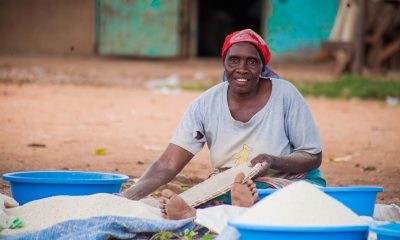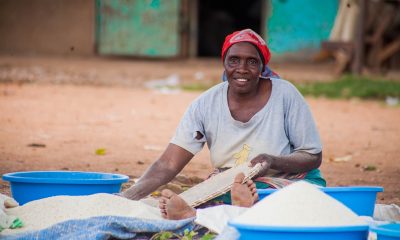Africa
African Integration: A priority economic growth lever for the African Development Bank
The African Development Bank supports the African Union’s Vision 2063 and is fully committed to the advent of a Continental Free Trade Area (FTAAf), it says in a press release published on February 2nd, 2021.Significant investments have already been made by the Bank to accelerate intra-African trade. About 390 kilometers of cross-border roads have thus been completed in 2018 alone.

Regional integration has been an integral part of the mandate of the African Development Bank Group since its inception. In this regard, it figures prominently among the five operational priorities of the institution. The Bank supports the African Union’s Vision 2063 and is fully committed to the advent of a Continental Free Trade Area (FTAAf) so that countries can benefit from the opportunities offered by a large regional market and the spillovers of stimulated intra-regional trade.
Read more on the subject and find other economic news with the Born2Invest mobile app.
The effective entry into force of the FTAAfTA on January 1st, 2021
It is expected to strengthen economic growth and accelerate industrialization, explained the African Development Bank in its Annual Review of Development Effectiveness (ARDE) 2019 published in December 2020.
The Bank also considers that regional integration associated with strong growth prospects, and taking advantage of the assets of a young population and the dynamism of cities, will be a real lever for strengthening Africa’s economic potential.
As such, the Bank’s support to countries and Regional Economic Communities (RECs), under its “integrating Africa” priority, reinforces the implementation of its four other major operational priorities: feeding Africa, enlightening Africa and providing energy, industrializing Africa, and improving the quality of life of people in Africa.
The Pan-African development institution has supported the FTAAfTA negotiation process and is committed to increasing its support for its implementation.
The Bank has already provided a grant of $4.8 million to the African Union Commission to finance the institutional support project for the implementation of the FTAAfTAA. This support contributes to the full establishment of a sustainable and efficient Secretariat responsible for the implementation of the Agreement.
Significant investments have already been made by the Bank to accelerate intra-African trade. About 390 kilometers of cross-border roads have thus been completed in 2018 alone. In this area, the Bank has focused on major integrative projects such as the Trans-Gambian bridge, also known as the “Senegambia Bridge”, which links Senegal to The Gambia.
In addition to the marked acceleration of intra-African trade, these investments in niche markets targeted at African integration strengthen the competitiveness of African economies.
The Bank’s contribution to African integration is also measured through electricity generation and connectivity. In 2018 alone, the pan-African institution has built 480 kilometers of power transmission line plus another 2,430 kilometers of distribution line. Nearly 570,000 people have thus been connected to electricity.
African integration efforts involve the industrialization of the continent, which the Bank strongly supports through its “Industrializing Africa” priority, which aims to develop and better integrate industrial value chains.
The Bank’s window dedicated to the private sector has made it possible to mobilize resources to support the industrial initiatives of regional member countries through the creation of special economic zones.
Dividends from regional integration
At least one and a half million economic operators and businessmen across the continent benefited from the Bank’s private sector financing in 2018.
Successfully launched in November 2018 in Johannesburg, the Africa Investment Forum (AIF), another lever put in place by the Bank, helped mobilize additional resources to support the consolidation and expansion of the private sector on the continent.
In 2019, nearly $67.9 billion in financial commitments were recorded at the second edition of the AIF, an increase of 44% compared to 2018.
Behind this strategy, there is a clear desire to put in place ambitious plans to raise Africa’s industrial gross domestic product by 2025.
Many small and medium enterprises in the processing and financial market sectors will continue to benefit from the Bank’s substantial support.
The dividends of regional integration should eventually enable Africa to feed itself when it currently imports more than $30 billion worth of food every year. The dynamic of African integration supported by the Bank will undoubtedly have an impact on improving the living conditions of populations in a continent where 40% of the population lives below the poverty line.
__
(Featured image by Pixabay via Pexels)
DISCLAIMER: This article was written by a third party contributor and does not reflect the opinion of Born2Invest, its management, staff or its associates. Please review our disclaimer for more information.
This article may include forward-looking statements. These forward-looking statements generally are identified by the words “believe,” “project,” “estimate,” “become,” “plan,” “will,” and similar expressions. These forward-looking statements involve known and unknown risks as well as uncertainties, including those discussed in the following cautionary statements and elsewhere in this article and on this site. Although the Company may believe that its expectations are based on reasonable assumptions, the actual results that the Company may achieve may differ materially from any forward-looking statements, which reflect the opinions of the management of the Company only as of the date hereof. Additionally, please make sure to read these important disclosures.
First published in lefaso.net, a third-party contributor translated and adapted the article from the original. In case of discrepancy, the original will prevail.
Although we made reasonable efforts to provide accurate translations, some parts may be incorrect. Born2Invest assumes no responsibility for errors, omissions or ambiguities in the translations provided on this website. Any person or entity relying on translated content does so at their own risk. Born2Invest is not responsible for losses caused by such reliance on the accuracy or reliability of translated information. If you wish to report an error or inaccuracy in the translation, we encourage you to contact us.

-

 Africa2 weeks ago
Africa2 weeks agoCôte d’Ivoire Unveils Ambitious Plan to Triple Oil Output and Double Gas Production by 2030
-

 Business1 week ago
Business1 week agoThe TopRanked.io Weekly Digest: What’s Hot in Affiliate Marketing [NordVPN Affiliate Program Review]
-

 Cannabis3 days ago
Cannabis3 days agoCannabis Company Adopts Dogecoin for Treasury Innovation
-

 Biotech1 week ago
Biotech1 week agoPfizer Spain Highlights Innovation and Impact in 2024 Report Amid Key Anniversaries
























